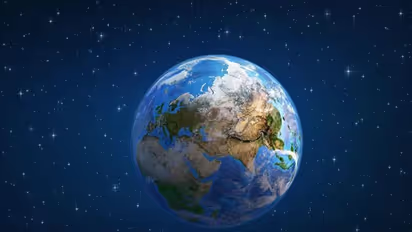Earth's days mysteriously getting longer; scientists wonder why

Synopsis
Over the past few decades, Earth's rotation around its axis which determines how long a day and there has been a steady increase in the length of days would be has been speeding up but the reason for it still remains a mystery.
Earth days are abruptly growing longer, and science is yet to offer a concrete explanation for it. Observations made by Atomic clocks and precise astronomical calculations have baffled scientists. That's because this development may have significant effects on our timekeeping as well as other precision technologies that control contemporary life, including GPS. Over the past few decades, Earth's rotation around its axis has been accelerating. This tendency has been shortening our days since it influences how long a day is. In reality, the planet achieved a record for the shortest day in the last 50 or so years, in June 2022.
Despite this record, the progressive speedup that began in 2020 has strangely turned into a slowdown. The length of the days is increasing once more right now, although the cause is yet unknown.
Our clocks show that there are exactly 24 hours in a day, but the time Earth really takes to complete one spin might vary by a very little amount. These changes might happen gradually over millions of years or suddenly in other cases. Even natural disasters like earthquakes and storms can contribute. As it turns out, a day very seldom contains precisely 86,400 seconds.
Also Read | Earth is rotating faster, completes rotation in less than 24 hours; sets record for shortest day
Due to friction caused by the tides under the impact of the Moon, Earth's rotation has slowed over millions of years. Each day is lengthened by this process by around 2.3 milliseconds per 100 years. The length of an Earth day was just approximately 19 hours a few billion years ago.
Another mechanism, which has been operating in the opposite direction for the last 20,000 years, has sped up the rotation of the Earth. Earth's mantle began gradually sliding toward the poles as the last ice age ended as a result of the polar ice sheets melting, which decreased surface pressure.
Also Read | Chinese Space rocket debris crashes back to earth over Indian Ocean; video goes viral
The relationship between the interior and surface of the Earth is also important over decades and longer. The duration of the day can be altered by powerful earthquakes, although usually only slightly. For instance, the magnitude 8.9 Great Thoku Earthquake in Japan in 2011 is thought to have accelerated Earth's rotation by 1.8 microseconds.
In addition to these significant shifts on a larger scale, weather and climate also have significant effects on Earth's rotation over shorter timescales, resulting in changes in both directions. It's unclear why this alteration occurred, even if back-to-back La Nina incidents have happened before, it may be caused by weather system changes. The ice sheets' melting pace may have accelerated, even if it hasn't significantly changed in previous years.